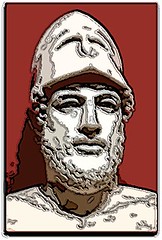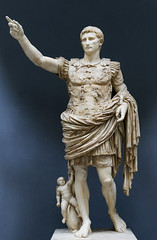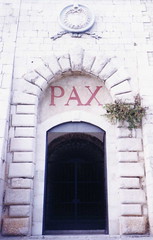| 4791549875 | Cyrus | Created the Persian Empire by defeating the Medes, Lydians, and Babylonians; was known for his allowance of existing governments to continue governing under his name |  | 0 |
| 4791551892 | Darius I | Third ruler of the Persian Empire (r. 521-486 B.C.E.). He crushed the widespread initial resistance to his rule and gave all major government posts to Persians rather than to Medes. |  | 1 |
| 4791554165 | Persepolis | A complex of palaces, reception halls, and treasury buildings erected by the Persian kings Darius I and Xerxes in the Persian homelan |  | 2 |
| 4791557596 | Zoroastrianism | One of the first monotheistic religions, particularly one with a wide following. It was central to the political and religious culture of ancient Persia. |  | 3 |
| 4791559466 | polis | A city-state in ancient Greece. |  | 4 |
| 4791562195 | hoplite | A citizen-soldier of the Ancient Greek City-states. They were primarily armed as spear-men. |  | 5 |
| 4791562196 | tyrant | a cruel and oppressive ruler |  | 6 |
| 4791563106 | democracy | A system of government by the whole population or all the eligible members of a state, typically through elected representatives |  | 7 |
| 4791563107 | Herodotus | Greek Historian, considered the father of History. He came from a Greek community in Anatolia and traveled extensively, collecting information in western Asia and the Mediterranean lands. |  | 8 |
| 4791563944 | Pericles | Athenian leader noted for advancing democracy in Athens and for ordering the construction of the Parthenon. |  | 9 |
| 4791563945 | Persian Wars | Conflicts between Greek city-states and the Persian Empire, ranging from the Ionian Revolt (499-494 B.C.E.) through Darius's punitive expedition that failed at Marathon. Chronicled by Herodotus. |  | 10 |
| 4791565239 | trireme | Greek and Phoenician warship of the fifth and fourth centuries B.C.E. It was sleek and light, powered by 170 oars arranged in three vertical tiers. Manned by skilled sailors, it was capable of short bursts of speed and complex maneuvers. |  | 11 |
| 4791566336 | Socrates | Athenian philosopher (ca. 470-399 B.C.E.) who shifted the emphasis of philosophical investigation from questions of natural science to ethics and human behavior. |  | 12 |
| 4791568383 | Peloponnesian War | (431-404 BCE) The war between Athens and Sparta that in which Sparta won, but left Greece as a whole weak and ready to fall to its neighbors to the north. |  | 13 |
| 4791568384 | Alexander the Great | He and his father defeated and united the weakened Greek city-states and he defeated the Persian Empire in 330 BCE thus spreading Greek culture and influence throughout Western Asia. |  | 14 |
| 4791570212 | Hellenistic Age | Greek culture spread across western Asia and northeastern Africa after the conquests of Alexander the Great. Ended with the fall of Rome. |  | 15 |
| 4791570213 | Ptolemies | Dynastic powers which emerged in Egypt in the aftermath of the conquest of Alexander the Great |  | 16 |
| 4791571084 | Alexandria | City on the Mediterranean coast of Egypt founded by Alexander. It became the capital of the Hellenistic kingdom of Ptolemy. Was a center for leading scientific and literary figures in the classical and postclassical eras. |  | 17 |
| 4791571085 | 12 tables | Rome's first code of written laws |  | 18 |
| 4791571086 | Republic | A form of government in which the people select representatives to govern them and make laws. |  | 19 |
| 4791571857 | Senate | A group of 300 men elected to govern Rome in the Roman Republic. |  | 20 |
| 4791572613 | Principate | A term used to characterize Roman government in the first three centuries CE, based on the ambiguous title princept ("first citizen") adopted by Augustus to conceal his military dictatorship |  | 21 |
| 4791572614 | equites | Prosperous landowners second in wealth and status to the senatorial aristocracy. Emperors used the equites to staff the imperial civil service. |  | 22 |
| 4791573465 | Augustus | First emperor of Rome (27 BCE - 14 CE) He restored order and prosperity to the Empire after nearly a century of turmoil. Grandnephew to Julius Caesar. |  | 23 |
| 4791573466 | aqueduct | A raised channel used to carry water from mountains into cities |  | 24 |
| 4791574343 | Pax Romana | A period of peace and prosperity throughout the Roman Empire, lasting from 27 B.C. to A.D. 180. |  | 25 |
| 4791574344 | Jesus | A Jew from Galilee in northern Israel who sought to reform Jewish beliefs and practices. He was executed as a revolutionary by the Romans. He is the basis of Christianity. |  | 26 |
| 4791574345 | Paul | One of the most important figures in the spread of Christianity, he worked to spread Jesus's teachings and wrote letters that explained key ideas of Christianity. |  | 27 |
| 4791575447 | Constantine | Roman Emperor between 306 CE and 337 CE. He issued the Edict of Milan which outlawed the persecution of Christians. He also founded the city of Constantinople, the future capital of the Byzantine Empire. |  | 28 |
| 4791576260 | Third-Century Crisis | Turmoil that beset the Roman Empire during much of the 3rd century C.E.: frequent changes of ruler, civil wars, barbarian invasions, and decline of urban centers. After 284 C.E. |  | 29 |
| 4791576261 | Qin dynasty | Chinese dynasty in 200s BCE. Lasted 15 years. Unified Chinese kingdoms, built the Great Wall and its emperor was the legalistic Shi Huangdi. |  | 30 |
| 4791577307 | Shi Huangdi | Founder of the short-lived Qin dynasty and creator of the Chinese Empire (r. 221-210 B.C.E.). He is remembered for his ruthless conquests of rival states and standardization. |  | 31 |
| 4791577308 | Han dynasty | imperial dynasty that ruled China (most of the time) from 206 BC to 221 and expanded its boundaries and developed its bureaucracy |  | 32 |
| 4791578181 | Xiongnu | A confederation of nomadic peoples living beyond the northwest frontier of ancient China. Considered barbarians by China. |  | 33 |
| 4791578182 | Gaozu | first emperor of former Han dynasty; a powerful general who takes the Wei River Valley and moves the capital to Xi'an; a sage-emperor |  | 34 |
| 4791580299 | Sima Qian | A Chinese scholar, astronomer, and historian; author of the most important history of ancient China, Historical Records |  | 35 |
| 4791581021 | Chang'an | Capital of Tang dynasty; population of 2 million, larger than any other city in the world at that time. |  | 36 |
| 4791581022 | gentry | A general term for a class of prosperous families, sometimes including but often ranked below the rural aristocrats. |  | 37 |
AP World History Chap 4 & 5 Vocab Flashcards
Primary tabs
Need Help?
We hope your visit has been a productive one. If you're having any problems, or would like to give some feedback, we'd love to hear from you.
For general help, questions, and suggestions, try our dedicated support forums.
If you need to contact the Course-Notes.Org web experience team, please use our contact form.
Need Notes?
While we strive to provide the most comprehensive notes for as many high school textbooks as possible, there are certainly going to be some that we miss. Drop us a note and let us know which textbooks you need. Be sure to include which edition of the textbook you are using! If we see enough demand, we'll do whatever we can to get those notes up on the site for you!

